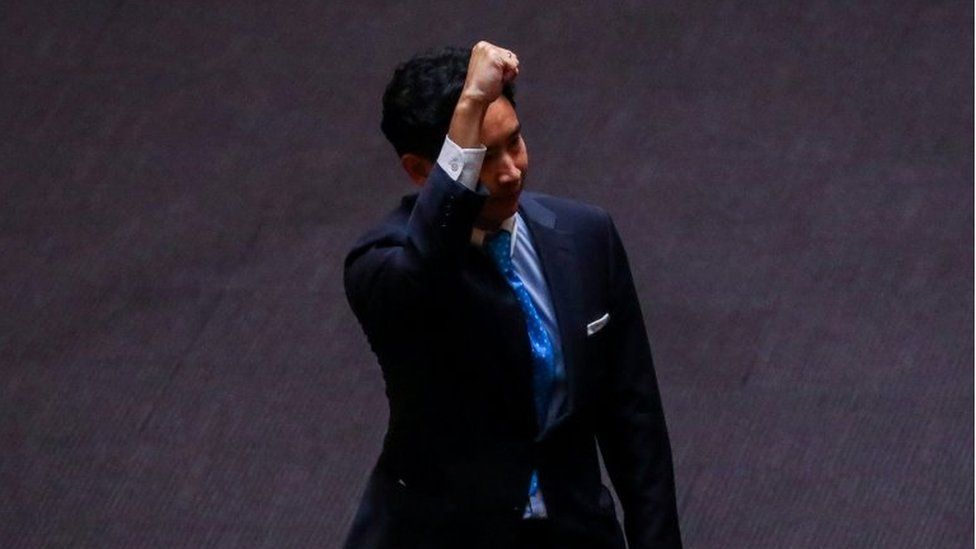Thai reformist Pita Limjaroenrat’s bid to be nominated prime minister has ended, prompting outrage from his supporters after he won May’s election.
The 42-year-old was first dramatically suspended from parliament by the constitutional court, forcing him to leave the debating chamber.
Lawmakers then agreed to block a second vote on whether he should be PM.
The Move Forward party leader had swept to victory in the general election as voters rejected years of military rule.
But to seal his victory, he needed the approval of parliament – which he failed to secure last week, plunging the country into political limbo.
The constitutional court must now decide whether he should be disqualified from parliament for owning shares in a long-defunct media company.
“I would like to say goodbye until we meet again,” Mr Pita said, raising his fist as he left the floor of the assembly to cheers from party allies.
Mr Pita, a Harvard graduate and former tech executive, won on the promise of major reforms, including a pledge to amend lese-majeste, Thailand’s strict royal defamation laws, pitting him against the unelected senate and other conservatives who say he poses a threat to the monarchy.
Outside parliament, Move Forward supporters wondered what the point of the election had been.
“Why ask people to go to the polls? Why don’t you just pick someone from your families to be the prime minister?” asked one man, AFP news agency reported.
“Pita is not wrong at all. He did everything right,” a woman said.
Before he was forced to leave parliament, Mr Pita had said he would stop working as an MP until the court made its decision.
“I think Thailand has changed and will never be the same since 14 May,” he said, referring to the date of his election victory.
“The people have won halfway, there’s another half to go.”
Uphill battle
Mr Pita needed the votes of more than half of the 749 members in parliament’s two chambers to become prime minister.
Last week, he secured only 324 votes, 51 short of the required 375. He had a clear majority from elected MPs in the lower house, but not from the upper house.
He always faced an uphill battle, as there was little evidence that the 249 upper house senators would support him. They were all installed by the military leaders of a 2006 coup as a brake on any democratic outcome that the military and royalists were uncomfortable with.
Move Forward is popular among young Thai voters who wanted to end nearly a decade of conservative military rule.
Art Chaturongkul, a 39-year-old living in Bangkok, said he and fellow supporters are deeply concerned as they see Mr Pita as representing their voices in the parliament.
“I’m filled with mixed emotions. Utter rage, frustration, and disappointment. It feels like a setback to the democratic process,” he had earlier told the BBC.
Move Forward has formed a coalition government with seven other parties, including Pheu Thai, the second most popular party in the May election.
Many young voters switched to voting for Move Forward because Pheu Thai had been unwilling to rule out doing deals with the military.
Pro-establishment campaigners have sought to block Mr Pita from taking the reins of power after the shock election results in May.
Two cases have been filed against him in the conservative-leaning Constitutional Court. Alongside the one for which he was suspended, the other complaint claims Move Forward’s proposal to amend lese-majeste laws – which have seen hundreds of critics of the monarchy jailed – amounts to an attempt to an overthrow Thailand’s entire political order.
There is a precedent for what is happening now. In the 2019 elections, Future Forward – the predecessor to Move Forward – was dissolved by the Constitutional Court after it was found to have violated electoral rules.
Since 2008, it has also dismissed three PMs aligned with former premier Thaksin Shinawatra, who was toppled by a 2006 coup.
Ironically his party, Pheu Thai – which has been on the receiving end of nearly all of the Constitutional Court’s rulings – is now poised to benefit from this latest ruling against its coalition partner.
There is no love lost between Pheu Thai and Move Forward, particularly as the former has taken the latter’s mantle as a champion of democracy.
But despite winning the election, Mr Pita may have to accept not only giving up the top job, but having no place at all in the new government.
Additional reporting by Jonathan Head
Related Topics
- Asia
- Thailand
